NC DAs Push For Legalized Nifonging
Nifong's Ripples Reach General Assembly
The unprecedented statement from the North Carolina Conference of District Attorneys revealed not only that Nifong had become a pariah among his peers, but also that the state’s elected district attorneys shared a concern that they would all suffer if Nifong’s ripples caused the General Assembly to enact stricter safeguards.To support our speculation, we cited comments made by Forsyth County District Attorney Thomas Keith to the New York Times.“There are a number of safeguards in place under our laws to regulate actions taken by a District Attorney as well as sanction prosecutorial misconduct. (1) The voter’s in a prosecutorial district provide the first safeguard - they pass judgment on the qualifications and conduct of the persons who seek the job by casting their votes at the ballot box. (2) Ultimately the courts in each jurisdiction review and rule on each individual case that a District Attorney prosecutes to determine whether the District Attorney has followed proper procedure and the case is legally sufficient. The District Attorney is an officer of the court. The courts have authority to impose various sanctions such as contempt or dismissal of the criminal charges if the court finds prosecutorial misconduct. (3) The North Carolina State Bar has the authority to enforce the rules of professional responsibility that govern all attorneys including prosecutors; there are a number of rules that uniquely apply to prosecutors. The State Bar determines whether or not a District Attorney has violated those rules and, if so, what sanctions are appropriate. (4) N.C.G.S 7A-66 sets forth the statutory procedure for removal of a District Attorney from office. Among the grounds for removal are willful misconduct in office and conduct prejudicial to the administration of justice which brings the office into disrepute. A judge of the Superior Court Rules on all issues presented in any sworn affidavit submitted in such removal proceedings. (5) District Attorneys are subject to the provision of the recently enacted State Ethics Act; complaints against a District Attorney that are lodged under the law are reviewed and acted upon by the Senior Resident Superior Court Judge in the District. With these many safeguards in place, the conduct of District Attorneys is thoroughly regulated probably more than that of any other judicial officer in our legal system.” WRALThe inclusion of this painstaking outline of supposed safeguards in the NCCDA statement calling for Nifong to recuse himself, makes clear the aversion with which the group viewed additional state regulation, and their expectation that, without their unprecedented intervention, one Nifong ripple would likely lead to exactly that.
A recent article in the New York Times describes how far the Nifong induced ripples have traveled through the legal community from March until now.Confirming our expectation that the NCCDA primarily moved against Defendant Nifong in order to influence the General Assembly and not for the sake of justice, Anne Blythe reported on the efforts of the NCCDA to lobby for new legislation. One such bill, dubbed by some the "Nifong Protection Act,” seeks to legally allow North Carolina prosecutors the same opportunity to withhold evidence from potentially innocent defendants as Nifong illegally did in the Durham Hoax."Not only did Mr. Nifong misjudge the bar, he misjudged the North Carolina Conference of District Attorneys. Back in September, the conference had sent Mr. Nifong a letter offering help with the case, including support staff, a shadow jury and advice on responding to defense leaks.
“We try to take care of our own,” Thomas J. Keith, one of four district attorneys who signed the letter, said in an interview this month. Mr. Keith recalled Mr. Nifong’s response: “Tom, thanks for the letter, but I don’t need any help right now.”
“As the public criticism of Mr. Nifong escalated, his fellow district attorneys began to hear rumblings that some state legislators were threatening to seek new oversight laws for all district attorneys. The DNA revelations on Dec. 15 only heightened their alarm.
"On Dec. 19, several district attorneys met with Mr. Nifong and advised him to hand the case to a special prosecutor.
“He had hoped they would stand together; instead they wanted him to pull out. Mr. Nifong was stunned.
“Any hope he had of regaining their support probably ended three days later, on Dec. 22, when Mr. Nifong dropped rape charges against all three defendants, though he continued to press other sex offense charges. Mr. Nifong said he had acted after the woman told his investigator she could not be certain she had been penetrated by a penis. Although he did not say so at the time, the woman also changed several other major aspects of her story during that interview, including that just two, not three, lacrosse players had taken part in the attack. The third, she said, had only stood by.
“Among his peers, the questions were obvious: Why had he not closely questioned his victim months earlier? How could he pursue a case with such divergent accounts from the key witness? Where was the proof?
“The state bar filed its complaint on Dec. 28. Better than anyone, the district attorneys understood its rarity and potential political significance.
“That is what pushed us into action,” Mr. Keith said. NYT
Blythe writes:
“North Carolina prosecutors hope to roll back parts of the 2004 law that helped defense lawyers show the innocence of the three men charged in the Duke lacrosse case.Predictably, the NCCDA ignores the rampant withholding of evidence that prompted the open file discovery law in the first place and attempts to maintain the illusion that Defendant Nifong’s misconduct, characterized as “offensive” by NC Attorney General Roy Cooper, were the isolated actions of one rogue prosecutor.
“A bill proposed in the legislature would give district attorneys and their staffs greater leeway to withhold details from some interviews with witnesses and investigators. If the interviews were considered legal strategy talks -- or "work product" in lawyer jargon -- then notes taken from the meetings might not have to be shared with the defense.
“Defense lawyers are fighting the proposal, saying the changes would turn the clock back to a time when many prosecutors routinely sat on information that could help an accused person prove his innocence.
“The N.C. Conference of District Attorneys is pushing for the amendment not quite three years after the law took effect requiring prosecutors to open their entire case files to defendants. A series of wrongful convictions sparked the October 2004 "open discovery law."
The director of the state's district attorneys association acknowledged that Durham District Attorney Mike Nifong's widely criticized behavior in the Duke lacrosse case makes their proposal a tougher sell.In April, Joseph Neff of the News & Observer offered a brief historical review of the decade long process that led to the open file discovery law.
"We are hoping that the General Assembly will not take the acts of one prosecutor and hold the rest of them accountable for it," said Peg Dorer, director of the North Carolina Conference of District Attorneys. "Timing could not be any worse. But if we don't address this, it's going to shut the prosecutors down." Anne Blythe, News & Observer
Neff writes:
Early this year, a handwritten letter from the Bertie-Martin Regional Jail arrived at The News & Observer.Although the NCCDA attempts to paint the egregious misconduct of rogue prosecutor Nifong as an atypical aberration and asks that other prosecutors not be held accountable for his misdeeds, an examination of similar misconduct by several other North Carolina prosecutors serves as a reminder that the open file discovery law not only predates the Durham Hoax, but also was enacted due to the questionable actions of many other prosecutors. While Gell’s case is perhaps the most prominent instance of pre-Durham Hoax prosecutors withholding evidence in order to obtain a wrongful conviction, countless other examples can be found to demonstrate the need to prevent prosecutors from having the ability to totally decide on their own, without any oversight, what evidence they will or will not share with defendants.
The writer was Alan Gell, a former death row inmate jailed last year on charges of having sex with his underage girlfriend.
"What do you think about the Duke case?" Gell wrote. "I feel like each player needs to send me a thank-you card for making the discovery law!!" (He drew a smiley face.)
One of the biggest factors in the implosion of the Duke lacrosse case was a state law passed in the wake of the prosecution of Gell, who was convicted of murder and sent to death row after prosecutors withheld evidence pointing to his innocence. After the evidence was found, Gell won a new trial and was acquitted. Soon after, North Carolina adopted an "open file discovery law" that forces prosecutors to share their entire file with defendants before trial.
No ambush
Defense lawyers in the lacrosse case used the new law as a crowbar to pry open Durham District Attorney Mike Nifong's files from the moment charges were filed; witness statements, phone records, police reports and DNA evidence emerged. The evidence backed the players' contention that no sexual assault had occurred.
Under the old law, Nifong would not have had to hand over witness statements until after the witness testified. Under the old law, the accuser, Crystal Mangum, would have finished testifying under direct examination before Nifong was required to hand her statements to the defense to use in cross-examining her.
"It's been huge," said Mary Ann Tally, a defense lawyer who was part of a group of prosecutors and defense lawyers who drafted the bill. "It has moved us from trial by ambush, which we've had for years in North Carolina."
The open file discovery law actually traces its roots back to the mid-1990s, when the North Carolina General Assembly was rewriting the death penalty laws in an effort to speed up appeals and streamline the process.
Given the pressure from prosecutors, victim rights groups and then-Attorney General Mike Easley, the law's passage was inevitable, said Ken Rose, who was the director of the Center for Death Penalty Litigation at the time. Rose and other death penalty opponents turned to then-state Sen. Wib Gulley of Durham for help. Gulley inserted a clause that gave death row inmates the right to all police and prosecution files to help with their appeals.
Easley's office vehemently opposed Gulley's move, but Gulley managed to shepherd the clause into law. Easley's office fought it in the courts until the N.C. Supreme Court upheld it in a 1998 decision.
The U.S. Supreme Court has long required prosecutors to give favorable evidence to defendants, but prosecutors had the power to determine which evidence was or was not helpful. Once Gulley's law took effect, evidence emerged that prosecutors sometimes ran afoul of their obligations. Over the next few years, several death row inmates discovered that prosecutors had withheld favorable evidence. The most publicized case was that of Gell, who was convicted in 1998 of killing a retired truck driver in Bertie County.
Mary Pollard, then a civil litigator with the law firm Womble Carlyle in Raleigh, was shocked at what she found in files she received in the Gell case from the Attorney General's Office and the State Bureau of Investigation.
"Someone charged with murder gets less evidence than someone who slipped on a grape at a Food Lion," Pollard said.
Pollard found that prosecutors had withheld witness statements showing that Gell was in jail on theft charges when the man was slain. The prosecutors also withheld a tape recording of the state's star witness saying she had to "make up a story" for police.
The withheld evidence won Gell a new trial; a jury quickly acquitted him in February 2004.
That summer, state Sen. Tony Rand gave an ultimatum to the organizations representing prosecutors and defense attorneys: Work out an open file discovery bill or the legislature would pass its own.
The courtroom adversaries hammered out a deal. The new law applies to every felony case in North Carolina. While it has been used thousands of times, the Duke case has put a spotlight on the behavior of prosecutors. In the past, allegations of prosecutorial misconduct surfaced years after the fact. In the Duke case, the allegations came in real time.
Randy Lyon, Wilkes County District Attorney
During the 1996 [Charles Wayne] Munsey murder trial, Timothy Hall, known in criminal law parlance as a “jailhouse snitch,” testified that Munsey had confessed to him while they were both incarcerated at Central Prison. Prosecutors did not tell the defense about Hall until the witnesses were listed at the start of the trial. The defense attorneys tried to investigate the allegations during the trial, and requested the assistance of the prosecutor in collecting prison records and information. The attorney general’s office investigated and sent a memo to the district attorney stating that the Department of Correction had no record that Hall had ever been to Central and that it was “nearly impossible” for Hall to have been there without a record having been kept. Undoubtedly, this should have been disclosed because it meant that it was “nearly impossible” for Munsey to have confessed to Hall.Eric Saunders, Forsyth County Assistant District Attorney
In the memo, however, the assistant attorney general went on to advise the prosecutor, “As a former prosecutor, I would argue that the absence of documentation does not preclude the possibility that Hall was at Central [Prison].” The district attorney, Randy Lyon, in fact made this argument to the jury without disclosing the exculpatory memo to the defense attorneys. The “smoking gun” memo was only revealed because of the provisions of the 1996 post-conviction discovery statute. Judge Ross found this to be a discovery violation warranting a new trial. Munsey was moved from death row to a different prison while awaiting a new trial, but died of natural causes a few months after the hearing.
…
Furthermore, another man, Michael Hawkins, admitted to being the real killer. This admission was not pursued.
…
On January 5, 1998, a trial judge ordered Lyon to turn over the entirety of his records. Six days later, Lyon attended church, then went home and hanged himself. Lyon’s files contained Talbert’s memo and Hall’s prison records.
In 1984, Deborah Sykes, a Caucasian woman, was raped and murdered while on her way to work. Soon after and under great pressure, investigators charged 19 year old Darryl Hunt, a black man, with the crime. Hunt was convicted in a trial marked by the presence of unreliable witnesses including the prosecutor’s chief witness, Thomas Murphy. Murphy had been a member of the Ku Klux Klan. The state’s case was weak, too, in that there was a complete absence of physical evidence linking Hunt and Sykes. Prosecutors withheld hundreds of pages of police reports, including a two-page report of a 1986 interview with Willard Brown, whom police had briefly considered a suspect in the Sykes killing. That report was only released to Hunt's attorneys after Brown's arrest in 2003, 18 years after Hunt was first convicted. Brown confessed to the Sykes rape and murder in December 2003. After an appeals process that lasted well over 15 years and after three police investigations as well as a second trial, Darryl Hunt walked away from prison a free man on December 24, 2003.Ken Honeycutt, Union County District Attorney, and Scott Brewer, Union County Assistant District Attorney
As late as two days before Hunt’s release, District Attorney Tom Keith was steadfast in his belief that Hunt was involved in Sykes murder. Even after DNA evidence cleared Hunt of involvement and identified another man, Willard Brown, in the crime Keith was unwavering. Brown later confessed to the crime.
Assistant District Attorney Eric Saunders, in 2003, went so far as to question the accuracy of DNA results generally, as well as specifically in the Hunt case. He was settled in his belief that Hunt was guilty. He said, “After reading the [DNA] reports, there's no doubt in my mind that…Darryl Hunt committed this crime.”
…
"I don't think that any [DNA] results on Darryl Hunt alone is [sic] dispositive of this case. All it shows is that he didn't have vaginal intercourse with her." --Eric Saunders, Assistant District Attorney and prosecutor in Darryl Hunt case, after DNA evidence showed semen taken from murder victim was not a match with Hunt.
…
December 23, 2003:
“But Keith said yesterday that he still considers the case against Hunt to be closed.
“Hunt's supporters "are saying it exonerates him, and I'm saying it may or may not," Keith said.
...
Keith repeated yesterday a statement he made Friday, that authorities believe that the new suspect is a third person who they have previously said they believe was involved in the attack on Sykes.
The "third-person'' theory began to be discussed during Hunt's second trial in 1989.
December 21, 2003:
Don Tisdale, the original district attorney to prosecute Hunt in 1985, said he thought that Hunt was one of several people involved in the attack.
He said that it was revealing that Hunt's attorney, Mark Rabil, turned down an offer by the Winston-Salem Journal to give Hunt a lie-detector test as part of the newspaper's eight-part series on the case published last month.
"That was very telltale when they turned the polygraph down," Tisdale said.
Tisdale said that if Hunt passed an independent, trustworthy lie-detector test, he would consider helping to get clemency for Hunt.
[Johnathan Gregory] Hoffman was sentenced to death for a murder and robbery in Marshville, N.C. There is no physical evidence that ties Hoffman to the crime, and he has never made a confession to authorities. The state’s star witness, Johnell Porter, explained that Hoffman had made a jailhouse confession to him. But Porter might have been viewed as less than credible because of a plea bargain that authorities offered him. Porter, a career criminal, saved himself from life in prison (instead he got eight years) by testifying against Hoffman (years later he admitted that he had lied about Hoffman’s confession). The prosecution did not turn over this important evidence and gave the jury the false impression that the witness was not offered any immunity deals. There was no other evidence that tied Hoffman to the crime.
Seven and a half years later, the prosecutors’ hiding of this evidence has come to light. As a result, Hoffman has a new trial scheduled for October 2006.
Because of prosecutorial deception, the jury was unaware that the witness was motivated by a plea bargain. Prosecutors have claimed that they were unaware of the immunity deals, but unequivocal proof of their knowledge has since been discovered. In an interview report under the headline “Things to do Ref. Porter [the witness],” one of the prosecutors wrote that they needed to “meet with U.S. Attorney and get some concessions made to Porter [the witness] in the event he testifies for us.” Prosecutors gave an altered version of this interview report to the court, critically omitting this note.
…
Prosecutors Ken Honeycutt and Scott Brewer have said they were unaware of Porter's deals, other than a promise they made to put in a good word for him when he was sentenced on a bank robbery charge. That deal was discussed several times in court. They said a federal prosecutor arranged the other deals with Porter's attorney and didn't tell them. Honeycutt and Brewer have denied wrongdoing. In an interview conducted in April of this year, Porter said Honeycutt and Brewer discussed the pending deals with him in the Mecklenburg jail. Porter's former attorney, Aaron Michel, has said in an affidavit that he, too, was at the meeting when Honeycutt discussed the deals. Brewer was there as well, the affidavit states. The N.C. State Bar has stated that it has evidence the men committed felonies--specifically obstruction of justice and subornation of perjury. However, the disciplinary committee of the N.C. State Bar, dismissed the complaint because the case had missed a filing deadline. Criminal action is now in the hands of Union County DA, Michael Parker.
Ken Honeycutt retired from the DA’s office 7 months after Hoffman was awarded
a new trial. He is now in private practice in Union County.
Scott Brewer is now a District Court Judge in Richmond County. In April 2006, new allegations surfaced stating that Brewer hid evidence in another murder trial. This allegation stems from the 1995 murder trial of Darrell Eugene Strickland. Strickland was convicted and is presently on death row.
…
"Johnathan Hoffman never told me nothing. I improvised the story because he had
snitched on me and robbed me. The opportunity came for me to get him back." --Johnell Porter, state’s star witness against Hoffman, describing why he fabricated his testimony against Hoffman.
Donna Justice, then a 27-year-old mother of three, was convicted of murder in 1984 when a prosecutor sat on evidence that could have cleared her.
She served 15 years behind bars before the truth emerged.
Justice's story shows that it can take years to right a wrongful conviction. To get even a belated fair shake, she had to get lucky: A new district attorney didn't like the case, some legal aid lawyers fought for her, and she landed in front of an open-minded judge.
But Justice's story also shows how prosecutorial misconduct does more than put the wrong person behind bars. Years after her release, the damage runs deep.
"I have constant nightmares," Justice said. "I'm afraid I'll wake up in prison. I dream about being in prison: I can see everything and everyone walking around the grounds. ... It's like a filth inside me I can't get out."
Justice, her brother, Elliott "Peppy" Rowe III, and her former boyfriend, Mitch Pakulski, fill a formidable chapter in the annals of North Carolina justice.
In a series of trials and mistrials starting in 1984 in Haywood County, then-District Attorney Marcellus Buchanan hid damaging evidence about his two star witnesses -- a convicted felon and a police officer with a felony record.
He sat on evidence from an assistant police chief that contradicted the felon's testimony, even though state law and the U.S. Supreme Court required him to turn over evidence helpful to the defendant.
After 15 years in prison, Justice, Rowe and Pakulski were released in 1998 when Superior Court Judge Jesse B. Caldwell III threw out the convictions.
"I've never experienced anything like this," Caldwell said. "An injustice was finally righted."
…
District Attorney Marcellus Buchanan and others in law enforcement withheld evidence and intimidated witnesses in the murder trials of Donna Justice, Elliott "Peppy" Rowe III and Mitch Pakulski, whose convictions were overturned:
- Buchanan did not disclose that his star witness, David Hugh Chambers, had been promised "first-class treatment" by investigators. Chambers' mother delivered home-cooked meals, and Chambers had unlimited phone contact with his attorney. Buchanan took his own television, a 9-inch black-and-white set, to the jail and gave it to Chambers, along with a table to set it on.
- Waynesville Assistant Police Chief Coleman Swanger drove by the scene about the time of break-in. His observations contradicted Chambers' testimony. Swanger relayed this to investigators several times, but police and prosecutors never told the defense attorneys. Swanger came forward after he retired.
- During the first trial of Pakulski and Rowe, Buchanan announced that he would arrest the 19 alibi witnesses from Toledo, Ohio, who testified for Justice. Buchanan said he would charge each with multiple counts of perjury if they returned to North Carolina.
- To rebut the alibi witnesses, Buchanan used John Holcombe, a part-owner of a nightclub who said he had seen Justice and Pakulski in town one day before the murder. Days after he told this to investigators, the Waynesville police hired him despite Holcombe's felony record. State law forbids felons from police work. Holcombe testified in uniform at the trial.
- After Justice was convicted, Buchanan engineered a gubernatorial pardon for Holcombe. As the first trial of Rowe and Pakulski got under way. Buchanan wrote to Gov. Jim Hunt in May 1984 and asked him to wipe away the felony record of Holcombe, who was to testify at retrials. Others also wrote, among them seven law enforcement and court officials, including Robert Burroughs, the trial judge. Gov. Jim Martin eventually pardoned Holcombe.
Born in Haiti, Lesly Jean immigrated at 12 to New York, where his few family members took little interest in him. He grew up in a part of Brooklyn where street fights were common.David Hoke and Debra Graves, Assistant Attorney Generals
At 19, he joined the U.S. Marine Corps to toughen himself up and to be with people he could count on for support, structure, even love. He went overseas, to the Mediterranean and through the Suez Canal.
Back at Camp Lejeune, on a Monday night in July 1982, he walked into a Dunkin' Donuts store and had his new life shredded.
A Jacksonville police officer stopped him. Jean, the officer said, resembled the composite drawing of a man who had raped a woman nearby five days before. Three months later, Jean was convicted of rape and sexual assault and shipped off to Central Prison to serve two consecutive life terms.
…
The jury had convicted Jean on the testimony of two eyewitnesses, the victim and a police officer who briefly stopped the rapist before he fled.
Their testimony was shaped by hypnosis, the details of which were withheld from Jean and his lawyer.
The hypnosis was conducted by the Jacksonville chief of detectives, Delma Collins, who had no training in psychiatry or psychology. Judges later ruled that Collins asked leading questions and focused the victim's attention on Jean's photo. He did not keep a detailed record of the subjects' pre-hypnosis memory.
Jean learned about the hypnosis only after the victim testified on direct examination.
Jean's lawyer twice asked the prosecutor for audiotapes, records or other material on the hypnosis but received nothing. Four Marines testified that Jean was in his barracks that night.
Jean lucked into a passionate advocate, Paul Green, a lawyer at N.C. Prisoner Legal Services. Green got a court order to unearth the audio recordings and other materials. The 4th U.S. Circuit Court of Appeals freed Jean in 1991. Had prosecutors handed over the recordings and records of the hypnosis, Jean probably would not have been convicted, the court said.
Collins, the chief of detectives, said he discussed the hypnosis with the district attorney's office. Walter Vatcher, the assistant prosecutor who tried the case, said the police never gave him the tapes.
In 2004, the NC State Bar charged that the two former prosecutors in the Gell case had withheld evidence and made false statements to a judge in the 1998 murder trial that put Gell on death row. The prosecutors, David Hoke and Debra Graves, withheld a tape recording of the state’s star witness which stated that she had to “make up a story” about the murder for the police. The prosecutors also withheld eight witness statements that indicated the murder had occurred while Gell was in jail on an unrelated charge. The prosecutors told the judge that they had handed over all such statements. Hoke and Graves later stated that they did not know these statements existed as they did not know the full contents of their files.As the prosecutors in the above cases demonstrate, open file discovery, which allows an opportunity for timely exposure of prosecutorial misconduct like that of Defendant Nifong and others, remains a vital safeguard. The NCCDA’s push to legalize nifonging, especially coming on the heels of the Durham Hoax which clearly demonstrated the necessity of open file discovery as a tool to prevent wrongful convictions, gives the impression that the State’s elected district attorneys wish to protect and legally enshrine future nifonging, rather than prevent such shameful misconduct.
Ultimately the NC State Bar handed out “slight” punishment for the two ex-prosecutors. Formally charged with 1) failing to turn over evidence that would have been helpful to Gell; 2) failing to supervise the conduct of their chief investigator; and 3) bringing the judicial system into disrepute by their conduct; Hoke and Graves were given the least possible punishment, a reprimand—“a formal, written scolding.”
…
"I haven't ever heard from them [Hoke or Graves, the ex-prosecutors], and they won't even look at me…[t]hey slapped high fives and hugged each other when I was sentenced to death. Is that professional conduct?" --Alan Gell, of his former prosecutors.
'Nifong protection act'
Under the legislative proposal, for example, Nifong could have withheld notes from interviews done by Linwood Wilson, his chief investigator in the lacrosse case. Wilson's December interview with Crystal Gail Mangum, the accuser in the case, led to the dismissal of rape charges. During that interview, Mangum changed her version of what happened from an earlier telling, saying she longer was certain she had been raped.“Let's Legitimize What Mike Nifong Did”
Defense lawyers say the bill proposals as worded now are unacceptable.
"I call this the Nifong protection act," said Mary Ann Tally, a representative of the N.C. Academy of Trial Lawyers working on the negotiating team. "You're protecting Nifong. You're not protecting the public from Mike Nifong. I'm more concerned about protecting the public from Mike Nifong than protecting him."
Charlotte Attorney Jim Cooney just got an up-close-and-personal look at what happens when a district attorney doesn't turn over all the information he has about a case. Now Cooney, the defense attorney for Duke lacrosse player Reade Seligmann, is watching some in the state legislature try to strip away the state law that kept three Duke students who were innocent of the charges against them from being convicted of crimes they didn't commit.While it is difficult to imagine that the State’s prosecutors genuinely desire the ability to more easily railroad innocents, the doublespeak and evasion used to defend the proposed bill paints a disturbing picture.
"I call them the 'Let's Legitimize What Mike Nifong Did,' acts," Cooney says of the parallel state house and senate bills that could once again block defendants and their attorneys from accessing prosecutor's files -- and evidence of their innocence contained within them.
The Supreme Court has ruled that defendants are entitled to any evidence prosecutors have that proves they're innocent, called "exculpatory evidence." But before North Carolina's open file discovery law passed in 2004, defendants weren't entitled to see a prosecutor's files, so prosecutors decided what was "exculpatory" and thus whether defendants even knew the evidence existed.
Say the accused killer in an armed robbery was white, but a witness tells the prosecutor or his investigators that the person who pulled the trigger was black.
"Under this bill, the DA wouldn't have to produce it [notes of the interview] unless the DA believed that was evidence of innocence," says Cooney. "The DAs would always take the position 'no such thing.'"
…
"What they have proposed essentially undoes everything that has been done the last four or five years and again it's going to mask the truth in these cases and all that leads us to is innocent people being convicted," says Cooney. "For the life of me I cannot understand in view of what has played itself out in Durham why the district attorneys believe this is a good time to actually cut back on the open file discovery provisions. This bill isn't written for DAs who follow the rules. The bill is written for DAs who aren't following the rules."
Smoke and mirrors from Rand and Willoughby
Then came the open file discovery law of 2004, which was passed after prosecutors withheld evidence that put innocent men on North Carolina's death row. Without the 2004 law, much of the exculpatory evidence Durham County Prosecutor Mike Nifong illegally withheld in the Duke case would never have come to light because Nifong wouldn't have been required to inform defense attorneys it existed.More from Willoughby
But that could soon change. A line in both proposed bills reads: "Disclosure is also not required of legal research or of records, correspondence, reports, memoranda or trial preparation interview notes prepared by the prosecuting attorney or by members of the prosecuting attorney's legal staff."
When asked why he sponsored this legislation, Sen. Tony Rand initially claimed he was trying to protect witnesses and victims' social security numbers and personal identification. If prosecutors have to turn over their whole files, he says, defendants could commit identity theft and have in some cases.
When I pointed out that the bill makes no mention of social security numbers or personal information, which could be redacted, and that the language in the bill would close prosecutors' entire files to defendants again, he explained that he couldn't discuss the bill with me because he'd "only seen it twice." Rand says he isn't very familiar with the language in the bill he sponsored and referred me to some prosecutors backing the bill for an explanation of what it meant. Rand also admitted that there wasn't any language in the new bill about social security numbers, but promised to "get that worked out in committee."
Rand then pointed out that defense attorneys don't have to let prosecutors know if their clients confess to them, then insisted he supported open file discovery and said he sponsored the original 2004 bill.
State legislator Ray Warren, a former sheriff who sponsored the House version, was equally stumped when I asked him to explain why he'd sponsor a bill to roll back open file discovery. He too insisted he supported open file discovery and wanted to protect social security numbers from disclosure, but couldn't explain how the language in the bill did either, even though he sponsored it. He said he got a copy of the bill from a North Carolina district attorney's association, and that Wake County District Attorney Colin Willoughby could explain the intent behind the language in the bill to me.
Willoughby explained that part of the motive for the bill was to protect criminals from getting victims' and witnesses personal information, which in several cases in Wake County had led to identity theft. That part hasn't been put into the bill yet, he says.
As for the rest of the bill, Willoughby explained that it was unfair to expect prosecutors to take notes at every meeting they have with witnesses if witnesses just kept saying the same thing.
Again, I pointed out that the bill doesn't allow prosecutors to withhold just repetitive notes, but all trial preparation notes, legal research, records, correspondence, reports and memoranda prepared by a prosecutor and his staff. Willoughby then got huffy and the interview ended. Before it did, he told me he didn't know who wrote the language in the bill either, and declined to explain it.
What further worries prosecutors is a recent N.C. Court of Appeals ruling affirming that prosecutors need to make a record of all meetings with witnesses and provide notes to defendants.Comparing Willoughby and Rand’s unsteady arguments regarding identity theft to the reaction of former NCCDA president Jeff Hunt to the hard fought negotiations with defense attorneys that preceded the 2004 open file discovery law adds to the impression that the new arguments are clearly contrived.
"You're setting the prosecutor up to fail," said Colon Willoughby, Wake County District Attorney.
Willoughby said he interprets this to mean that if a prosecutor were to speak with an investigator or other witness in a hallway and find out nothing new, the law would still require a memorandum from that meeting.
"This happens all the time," Willoughby said.
Not only would such reports be cumbersome for the prosecutor and his staff, Willoughby said, it could create an atmosphere where anyone who forgot to mention a hallway meeting could be accused of violating ethics and professional conduct rules.
Defense lawyers say it should not be left to the discretion of a prosecutor to determine what might help a defendant fight charges.
District Attorney Jeff Hunt of Hendersonville, immediate past president of the DAs' group, said the bill protects crime victims and witnesses as well as defendants. For example, either side can ask the judge to hide the identities or existence of potential witnesses who might be in danger of threats or other reprisals.It’s difficult not to see the new legislation as an effort on the part of the State’s district attorneys to renege on the compromises hammered out with defense attorneys in 2004. A review of the arguments made by the NCCDA fighting against the open file discovery law alarmingly reveals that the arguments made now seek even more prosecutorial discretion than the NCCDA sought while trying to fend off the 2004 legislation. Incredibly, in the wake of the Durham Hoax, the NCCDA is seeking a revision which would allow prosecutors to decide what evidence must be disclosed, even though their failed compromise argument in 2004 was to let a judge decide what to allow.
…
"When we reduce the rare chance of an erroneous conviction, the prosecution benefits," Hunt said. "Our product is justice, not necessarily convictions."
('We're going to have fairer trials', News & Observer, July 13, 2004)
Let judges rule on what to open
Recent articles in The News & Observer have magnified a serious but certainly not widespread concern regarding the failure of prosecutors to provide adequate discovery in criminal cases.In light of the disrepute brought to North Carolina's criminal justice system by the Durham Hoax, it is impossible to believe that Hunt’s argument that “the North Carolina criminal justice system has been and continues to be the envy of most other states” has passed the test of time. Other arguments, however, made prior to the passage of the open file discovery law do appear to have continued merit. One such argument, perhaps the most powerful one made in 2004, was presented by attorney Brad Bannon in a guest column for the News & Observer.
The N.C. Conference of District Attorneys, whose members are the 39 elected district attorneys in our state, does not condone or excuse any lawyer, prosecutor or defense counsel who abuses the statutory requirements for discovery or the State Bar's Rules of Professional Conduct. Intentional violations of those rules should result in sanctions against the offending lawyers.
The discovery laws in North Carolina have been evolving since the 1970s. In 1973, the General Assembly declined to require open file discovery out of the express concern that defendants or their attorneys might use the state's evidence before trial to violate the rights of victims or their families or to intimidate potential state's witnesses.
The Conference of District Attorneys has sought a change in the rules that would require the trial judge to review discovery in capital cases before trial and to decide what materials the defense should see. That change could have saved costly retrials. But without the support of the criminal defense bar, that legislation died quietly.
Current law requires district attorneys to judge whether certain evidence is material and favorable to the defendant for trial or sentencing and should therefore be given to a defendant before trial. The district attorney's decision is subject to appeal by the defense. The state, however, has no right to appeal "not guilty" verdicts. Therefore, indiscretions by defense attorneys who may bend the rules to gain acquittals for their clients are virtually never revealed.
Those district attorneys who oppose open file discovery before trial seek only to protect victims, their families and witnesses at the risk of their judgment being second-guessed years later. In fact, some district attorneys do open up their files in an effort to avoid costly and time-consuming appeals.
Our state bar enforcement is conducted primarily by lawyers and lay people who serve without pay because of their commitment to the profession and to the courts. This responsibility for discipline of the legal profession is shared with the judiciary. Both of these groups, though thinly staffed, are well-situated to evaluate the conduct of lawyers and respond appropriately. North Carolina's chief justice has made professionalism the centerpiece of a properly functioning legal system. Our state bar and our judiciary should continue their diligent efforts to properly ensure that justice, and not gamesmanship from either side, prevails.
Rather than develop new rules in the legislature, we should adequately fund our state bar and judiciary and encourage them to enforce the rules we have. They are in the best position to evaluate the seriousness of a particular violation and the prior conduct, good and bad, of lawyers.
A large majority of North Carolinians have continued to support the death penalty in appropriate cases. The Conference of District Attorneys urges those who oppose the death penalty to do so without discrediting the entire criminal justice system simply to gain an advantage.
The North Carolina criminal justice system has been and continues to be the envy of most other states.
(Jeff Hunt; Special to the News & Observer, November 16, 2003)
Justice for all means opening the files
Two months ago, I watched over Alan Gell's shoulder as he was freed after spending nearly nine years incarcerated for a murder he did not commit, five of those years on death row. Until then, working on Gell's defense was about nothing more than doing the right thing for him. But in those moments after the verdict, I began to appreciate what had just happened on a scale grander than one man's life. From a systemic standpoint, his case represented a nightmare scenario most of us usually dismiss as only happening in movies or books.Currently there are no less than five bills under consideration by the NC General Assembly that aim to modify the State’s open file discovery law. It is imperative that the state’s lawmakers examine the instances of injustice which motivated the decisions made when the law they now seek to change was first instituted. In light of the Durham Hoax and the disrepute the Hoax has brought to the State‘s criminal justice system, it is unconscionable that the legislature, manipulated by disingenuous, self-serving arguments made by Nifong’s peers, consider any action that condones, protects, or enables a repeat nifonging or a return to the days when innocents were not only wrongfully prosecuted but also convicted, imprisoned, and, at times, sentenced to death.
Two teenage girls participated in a Bertie County murder and then pointed their fingers at Gell, a petty criminal and drug dealer, an easy target. But no physical evidence linked him to the crime, and 17 witnesses told police in the weeks following the murder that they saw the victim alive after the last point in time when Gell could have killed him. The girls were secretly recorded talking about making up a story and lying to the police in the investigation. But their final story was believed, and Gell was charged with capital murder.
For years, he sat in jail, awaiting trial and facing the death penalty. Despite a pretrial duty placed on prosecutors by ethical rules, constitutional law and a court order in the case to turn over evidence pointing toward Gell's innocence ("exculpatory" evidence), his prosecutors failed to disclose the 17 witness statements or the tape of the girls' conversation.
The day the trial started, a defense lawyer showed the judge a newspaper article from the previous day which stated that three witnesses had seen the victim alive after Gell could have killed him. Again, the defense lawyer asked for exculpatory evidence. Again, the court ordered the prosecution to disclose it.
This time, the prosecution responded that there might be "as many as five or six" such statements and ended up disclosing eight. The witnesses whose statements were disclosed had been re-interviewed, months after their initial statements, and acknowledged they might have been wrong about the last time they had seen the victim alive; but the other nine witnesses, whose names appeared on the prosecution's pretrial witness list but whose statements were not disclosed, had never been re-interviewed or formally expressed reservations about their memories. The prosecution also again failed to turn over the recorded conversation in which the girls discussed lying to the police. Gell was convicted and sentenced to die.
@* @* @*
While he sat on death row, the state Supreme Court upheld his conviction. He was assigned lawyers for one last appeal before his execution. Thanks to a relatively new law requiring open file discovery in final appeals for death row inmates, Gell received a copy of his entire prosecutorial case file.
Only then were the remaining nine exculpatory witness statements and the secretly recorded conversation discovered. When Gell's lawyers asked for a new trial, the Attorney General's Office opposed the request, but a judge found that the evidence was exculpatory and ordered a new, fair trial. A year later, the only jury that ever got the full truth in the case heard from many of the 17 witnesses and focused in deliberations on the secretly recorded tape. They spent under three hours deciding Gell was not guilty.
@* @* @*
The question I am asked most by people who know I worked on Gell's case is, "What's going to happen to those prosecutors?" I tell them the State Bar is considering the matter, and I trust the bar will do the right thing and give those prosecutors the due process that was denied Alan Gell. And the prosecutors may not be the only law enforcement professionals whose conduct should be reviewed. Two of the re-interviewed witnesses testified in Gell's second trial about feeling harassed or pressured by law enforcement to modify their prior statements about the last time they saw the victim alive.
Whatever happens to any individual involved in the unjust effort to execute Gell, individual accountability alone is not enough to fix the problem. People will always be in charge of the system, and people are inherently fallible. While we cannot make people less fallible, we can certainly make the system less fallible.
And when government seeks to take a person's life or freedom, or just to make him a convicted criminal with all the stigma and lost opportunities that flow from that status, there is no room for error that can be avoided by intelligent changes in the system.
@* @* @*
The first change should be open file discovery in all criminal matters. Simply put, open file discovery would allow a criminal defendant to receive a copy of all information gathered or produced by law enforcement in the case against him. Under current state discovery laws, defendants are entitled to only a limited amount of that information, not even the names or statements of witnesses. Some prosecutors rightly choose to share the information anyway, but many do not.
The Constitution further requires pretrial production of exculpatory evidence. However, prosecutors alone are responsible for reviewing their files and making the inherently conflicted decision, from an adversarial position, of whether the information would help a defendant and should therefore be turned over.
Again, people are fallible. Whatever Gell's first prosecutors might say about their culpability in the failure to produce evidence of his innocence, they cannot deny that their failure resulted in an unfair trial that ended with a man being sentenced to die. Even assuming their conduct was negligent, that means they either failed to review their file and locate the exculpatory evidence, or they reviewed the 17 witness statements and secretly recorded conversation but erroneously decided it was not exculpatory. Miscarriages of justice from such "inexcusable neglect," as Attorney General Roy Cooper has called it, would not exist with open file discovery.
@* @* @*
Granted, information gathered in a criminal investigation may be so sensitive that prosecutors might rightly seek to withhold it from a defendant under exceptional circumstances. In fact, current discovery laws allow a prosecutor to ask the court to keep such information secret. In that scenario, a neutral judge -- rather than one of the adversarial parties -- determines whether information should be disclosed.
Others suggest that open file discovery should, if adopted, go both ways, i.e., defendants should have to give the prosecution their entire files as well. That suggestion exhibits an abandonment of core principles of our justice system: the prosecution has the burden of proof, and a defendant has the right to remain silent and should not be compelled to help the prosecution convict him. It also seems to equate a private citizen's defense team, whose ethical and legal duty is to zealously defend the accused individual, with law enforcement and prosecutors, whose ethical and legal duty is to serve the entire public by seeking justice and the truth, not simply a conviction of the person they determined to be guilty.
Open file discovery should be the rule. In tough budget days, it would save untold taxpayer dollars spent on appeals and successive investigations and prosecutions, and it would avoid the imprisonment or execution of innocent people based on the negligence of prosecutors.
What happened to Alan Gell has shattered many people's faith in our system of justice. Open file discovery is the proper first step in restoring that faith, especially in light of this equally chilling thought: if Gell's first jury had not sentenced him to die, he would not have been entitled to see the open file of his prosecution, and he would have spent the rest of his natural life in North Carolina's prisons: an innocent man. (Brad Bannon, N&O, April 20, 2004)
Two North Carolina newspapers, the Wilmington Star and the News & Observer, address the proposal to legalize nifonging with editorials this morning.
Wilmington Star:
News & Observer:N.C. prosecutors ask to cheatHoping not to get Nifonged, North Carolina's district attorneys are asking to get rid of rules that protect the innocent.
Protecting the innocent, after all, can undermine prosecutions and spoil political careers. The N.C. Conference of District Attorneys finds this intolerable.
It's asking the General Assembly to weaken a 2004 law that, in effect, required prosecutors to play fair - to turn over everything they know to the defense. The law was passed after several high-profile convictions were overturned because cases fell apart and several district attorneys were found to be lying lawbreakers.
Following that tawdry tradition, Durham DA Mike Nifgong withheld DNA evidence that weakened his case against the Duke lacrosse players. He wasn't trying to find truth; he was trying to win convictions - and his campaign to remain DA.
His embarrassed colleagues say they shouldn't have to put up with inconvenient requirements just because Nifong - one DA - messed up. But Nifong is hardly the only one.
Even if he were, North Carolina's laws should be written to encourage fairness and the search for truth, not to give prosecutors a leg up.
In this country, and in the Mother Country that bequeathed us the principles and procedures of fair trials, the ultimate goal of the courts is not to nail as many criminals as possible. It is to give accused citizens a fair chance to defend themselves from the vast powers of government - in this case, the vast powers of politicians who might railroad innocent people to win votes.
That danger is not theoretical. It is reality.
Objection
North Carolina district attorneys are pushing a bill to roll back changes that helped ensure justice in the Duke lacrosse case
Those advocating a bill in the General Assembly that would allow prosecutors to withhold details from their interviews with witnesses, along with some findings of their investigators, admit they've got a problem. His name is Mike Nifong, the Durham district attorney who rashly proceeded with a sexual assault case against three Duke University lacrosse players. The case was so weak that state Attorney General Roy Cooper later abandoned it and strongly criticized Nifong after the D.A. had to withdraw as prosecutor.Nifong, now fighting to save his law license, is a millstone around this attempt to give prosecutors a break, in that they could classify certain interviews and other information in a way that would allow them to keep it from defense attorneys. Basically, this is an attempt to roll back some provisions of a law passed in 2004.
This millstone ought to sink this bad, bad bill. The district attorneys pushing it think they've got a public relations problem because of Nifong. That's ridiculous. They've got a credibility problem most recently because of Nifong, but also because some other wrongful convictions led to a 2004 "open discovery" law that made more information accessible to defense attorneys. There's no indication that prosecutors have been hamstrung by that law. Convictions are still won. Jails are still full.
But in some cases since the law's passage, it's just possible that defendants who otherwise might have been wrongfully convicted were not, because their lawyers had information that helped their clients -- information that a district attorney unburdened by the 2004 law might otherwise not have disclosed.
Yes, for there is a problem that has long existed and may forever exist in the minds of some prosecutors, namely that the most important part of the job is winning. It's not. Justice is the point, conviction or acquittal. In the case of Nifong, the point was missed. He, for example, withheld evidence that showed DNA from four men who were not lacrosse players on or in the accuser around the time she said she was raped by the players.
Colon Willoughby, the Wake County district attorney and a respected one, says he fears that without changing that 2004 law, even casual hallway conversations between prosecutors and investigators or witnesses might require a written memo that then would have to be disclosed. So what? Ensuring justice isn't about the comfort and convenience of prosecutors. And again, the Duke lacrosse case simply undermines every argument those who are pushing for this bill use.
That case amounts to the new gold standard, or maybe that should be the tin standard, of wretched excess, of a prosecutor's determination to win no matter what. The 2004 law stands as a counter to that distressing attitude, and it should continue to stand. Trying to change it isn't just bad timing. It's a bad idea.
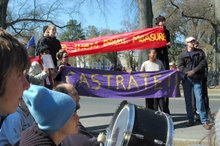




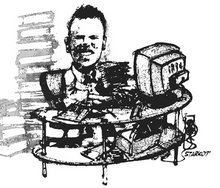
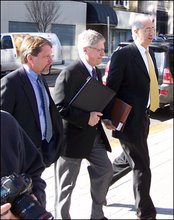
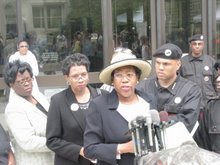
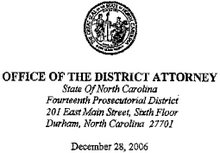
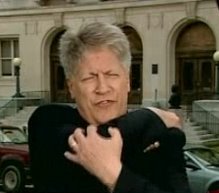

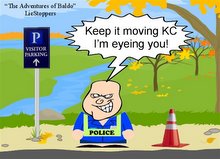



















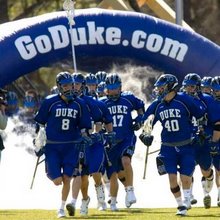

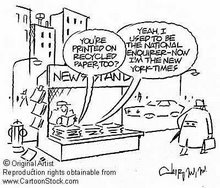





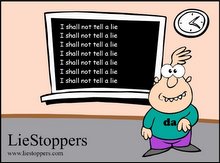






16 comments:
The director of the state's district attorneys association acknowledged that Durham District Attorney Mike Nifong's widely criticized behavior in the Duke lacrosse case makes their proposal a tougher sell.
"We are hoping that the General Assembly will not take the acts of one prosecutor and hold the rest of them accountable for it," said Peg Dorer, director of the North Carolina Conference of District Attorneys. "Timing could not be any worse. But if we don't address this, it's going to shut the prosecutors down." Anne Blythe, News & Observer
Although the open discovery laws were changed to prevent the abuses of past prosecutors, It was this one isolated incident, that proved that prosecution files need to remain open.
The defense team for the Duke 3 was able to disprove the charges against them before they could be wrongly convicted.
This was the intent behind the changes in the law, and in this case it worked (but almost didn't, because Nifong wasn't going to abide).
Durham Dweller
They're going in absolutely the wrong direction. If anything, they should be toughening the open discovery laws, and the best way to do that is to toughen the penalties against rogue prosecutors, of which North Carolina clearly has a glut. I'm all in favor of protecting SSN's of witnesses, but that should not get in the way of justice. That is more properly an administrative function. Hell, just redact the SSNs from any files and replace it with a bunch of x's in SSN format. The hills of North Carolina are alive with the sound of bullshit.
It is amazing after a year of Nifong's garbage that the legislature is looking to make it easier for people to get Nifonged. I am afraid the only thing that is going to make NC do the right thing is the Duke Lacrosse team bankrupting them with lawsuits.
Please write to the legislators asking them to can HB768/S1009!!
internete-mail@ncleg.net (readable by all Legislators
ncsenatemembers@ncleg.net (readable by all Senators)
nchousemembers@ncleg.net (readable by all House Members)
Carolyn says:
LieStoppers - once again you've earned my complete respect and admiration. Of course, you earned it long before now - today's post simply reaffirms that.
Thank you.
All you need to know is that WITH the 2004 Open Discovery Law in place, Nifong was willing to disregard his responbility to provide exculpatory evidence to the defense. Now the NCCDA is suggesting that the Open Discovery Law be watered down and we, the public, are expected to believe them when they say, "trust us." Don't make me laugh.
The countless cases of prosecutorial misconduct (some of the more high profile ones being outlined in this post) are proof enough that we, in fact, should not trust them. The reason is simple. Too many DAs get caught up in winning convictions, even if that means prosecuting someone who they know is innocent.
We need this law, and, as pointed out elsewhere need to strenthen it with MUCH HARSHER PENALTIES for DAs that violate the provisions. Reprimand, my ass. Nifong should be disbarred, thrown out of office, and serve prison time. Same for any other DA who gets caught withholding excupatory evidence in the future.
Nobody is forced to take a job as a DA. If these whining crybabies don't think they can do the job with the Open Discovery Law in place to make sure that they don't lie and cheat their way to a conviction, then they need to find some other line of work.
In the memo, however, the assistant attorney general went on to advise the prosecutor, “As a former prosecutor, I would argue that the absence of documentation does not preclude the possibility that Hall was at Central [Prison].”
I think this says it all: prosecutors believe they are free to spin whatever story they want, no matter how much it violates reality. Do you think a prosecutor and judge would permit a defense attorney to say "even though there are no records, he could have been there"? No, this would be thrown out of court immediately.
Historically, prosecutors have been expected to argue the FACTS. Now we see they are arguing tenuous theories. We saw Nifong doing the same thing. This makes me sick.
Sounds like, if this gets passed, they should also adopt a new slogan: North Carolina - we're not backward hicks, we just do everything that is expected of them.
Phillip, you have done lots of research on the open discovery issue. Why does North Carolina have to re-invent the wheel? Aren't there some other States or Federal jurisdictions that already have dealt with and solved the issue of having an open discovery system without hampering the ability of prosecutors to prepare their cases for trial? Is so, why can't NC just model its discovery procedures on those?
Durham Lawyer
3:02, I've often wondered the same thing about Alabama regarding our state constitution. With just shy of 800 amendments as of this year and nothing even remotely resembling home rule, you can see my frustration.
Wow...damn glad I do not live in NC. The only other group of prosecutors that could persecute at will, without evidence, was called the KGB.
9:02, before you point your finger at North Carolina, look in your own back yard. My guess is you'll find something you really don't like. I know I did when I looked at my state and the lack of a public defenders' office and other glaring deficiencies.
Durham Lawyer,
In comparison to other jurisdictions, NC's open discovery statute is unique and progressive. While there may be models to follow on some of the issues raised, there is no model that I have found yet to guide open discovery in total.
With regard to solving the issues without hampering the prosecutor's ability to prepare for trial it is important to recognize that the intended purpose of discovery in general, and open discovery, in particular is not at all related to the prosecutors trial prep. Rather, the purpose of discovery is to help both sides arrive at the truth. Or as described by the Florida Supreme Court: "to avail the defense of evidence known to the state so that convictions [will] not be obtained by the suppression of evidence favorable to a defendant, or by surprise tactics in the courtroom." With a purpose other than helping prosecutors prepare to win at trial and without similar open discovery statutes, it is difficult to find a model that fits both concerns.
I'll continue to research but the best I hope to find is a guide on some of the particulars. For example, some states have within their discovery rules, procedures for protecting while still sharing personal information on confidential witnesses. Other states allow depositions of witnesses, experts, and LE (handy when prosecutors don't want to bother with taking or sharing notes....). Some states also require a formal court inquiry, pre-trial, when discovery is not complied with (relaxing moderately the open discovery by allowing a specific exception or two but incorporating a strict and immediate penalty for non-compliance may be a fair compromise.)
It's easy to poke holes in the flawed arguments and proposals. Finding workable solutions and counter proposals is certainly more difficult.
Philip
America is based on a system of checks and balances. We place our trust in our lawyer, Judges, and D.A.'s. Our trust in our judicial system is because OF our system of checks and balances. A watered down Open Discovery Law will erode that trust and lead us down a road away from an institution all can have faith in.
I have a cyberbully attacking me and my family everyday on the internet. She writes child porno and puts me as the author. She chases me around the internet and attacks me on any website I join.
She has a blog where she writes libelous stuff saying I have child porno pages and that I use my camera to photograph children using my camera as a phallus. She has contacted my family. She has contacted my landlord 4 times trying to get information, telling him lies and trying to get my internet shut down. I do not know what to do to stop this woman. I try to defend myself. I try to ignore her. Ignoring her only prompts he to call people in my building.
What can I do about this?
Another month?!?!?!? That will give him just enough time to shred and destroy any other "evidence!"
We have waited over 2 years to have my brothers murder case re-opened, which Nifong did NOTHING!!!!!
I am OUTRAGED!!!!!!!! What the hell is going on that this rotten son of a bitch is allowed to continue on another month?!?!?!
The LAX3 case is NOT the only miscarriage of justice!!!!! Murders have gone unsolved, meanwhile this jackass parades himself to be holier than thou, and is still in office?!?!?!
The corruption in Durham has NOT been quashed, my faith in the legal system is destroyed, and I am madder than hell that we must go on waiting!!!!!!
For the love of God, this is truly unbelievable!!!!!!!!!!
Rhonda Fleming
Cleveland Ohio
Post a Comment